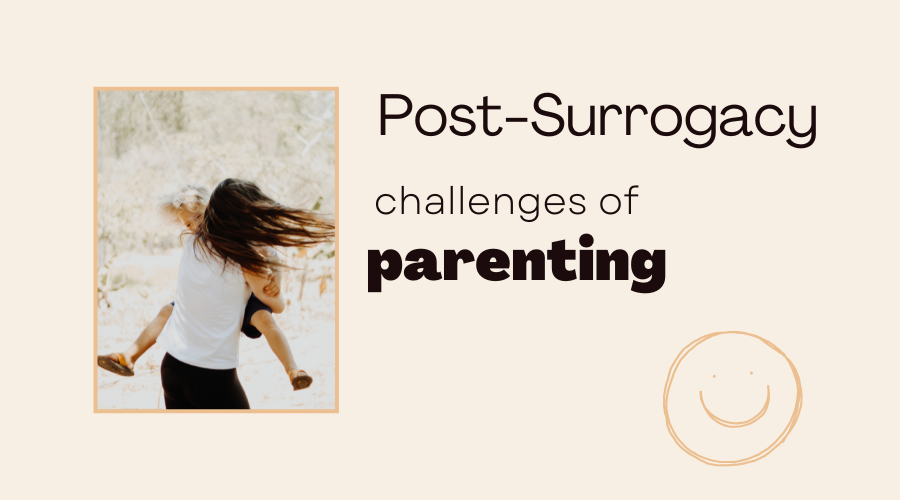Post-Surrogacy: The Challenges of Parenting and Bonding after the Child is Born
You may already know a lot about surrogacy and how it offers a perfect path to parenthood to many. Though the surrogacy procedure may seem complicated to many and calls for careful planning, the challenges do not stop when the child is delivered. Actually, the post-surrogacy period—when the child is at last in the arms of the intended parents—can present a unique set of challenges, especially with relation to bonding and adjusting to the new family dynamic.
In case you are an intended parent undergoing the surrogacy process or considering it, you should be informed of these possible post-surrogacy concerns. Knowing what to expect will enable you to confidently and more easily negotiate this change. That said, this post will look at some of the main concerns intended parents experience during surrogacy and go over ways to get beyond them.
Post-Surrogacy Concerns
1. Bonding with Your Baby and Emotional Adjustment
Emotional adjustment is among the toughest challenges following surrogacy. That said, many intended parents find the path to parenthood via surrogacy to be lengthier and full of expectation. When the baby is finally born, it’s natural to experience a mix of happiness, relief, excitement, and perhaps a little fear following months or perhaps years of waiting.
While some parents might struggle to relate in the early days, others might sense a strong, instantaneous connection with their infant. For individuals who were not physically involved in the pregnancy, this comes especially true. For instance, the intended mother might feel cut off from the pregnancy experience and, hence, the kid if she did not carry the baby. In the same vein, intended fathers who were not physically involved in the pregnancy could also have trouble bonding during the initial stages.
The good news is that bonding develops over time in a slow pace. Remember that emotional attachment and bonding doesn’t often happen right away and that’s quite normal. Moreover, great ways to build a bond are holding your infant, making eye contact, and having skin-to-skin contact. As you raise your child, this connection will naturally develop with time.
2. Negotiating Parental Roles and obligations
Many parents find the moment the baby is born as a swirl of feelings and obligations. Often mingled with the reality of sleepless nights, continuous feedings, and the heavy duty of tending to a newborn, comes the thrill of finally being parents. If you have gone through surrogacy, you could feel more pressure to prove yourself as a parent, particularly if you have struggled with conception or carried emotional weight from a protracted fertility quest.
Particularly when one adjusts to the new responsibilities of “mom” and “dad,” the first weeks or months following birth can be taxing. If you are not bonding as fast as you had intended, you could feel guilty or dubious of your capacity to raise the child. Remind yourself that, whether or not you choose surrogacy, everyone travels the road of adjusting to parenting and should treat them with grace during this period.
If you are a first-time parent, you could wish to spend some time learning about newborn care including nursing, baby sleep patterns, and handling infant health problems. You might find the confidence and support you need by consulting specialists, going to parenting seminars, or just chatting with other parents.
3. Appreciating the Legal and Identity Complexities
Many intended parents might not expect one element of post-surrogacy—the possible legal and identification complications following the birth of the baby. Though protective and well-considered, surrogacy agreements can be complex and you might have to negotiate legal processes to prove your parental rights and guarantee the child’s immigration or citizenship status.
Particularly if you are an overseas intended parent, the laws regarding surrogacy can be confusing in many nations, the United States, and others. This is where to get your parental rights finalized; you probably will have to follow legal processes. Also, in the case of international surrogacy, obtaining the baby’s passport and visa to return to your native country, you may have to fulfill certain formalities.
Furthermore, the child can have problems with identity particularly if they were born in a nation with different nationality or citizenship laws. When the kid is old enough to understand, some intended parents may also worry about how to explain the surrogacy procedure to her. Seeking competent advice from legal professionals and being ready for these legal and identity factors will assist to prevent problems.
4. Relationship with the Surrogate Post-Birth
Managing the bond with the surrogate presents multiple challenges for many intended parents once the baby is delivered. Common in many surrogacy agreements, this problem is usually more noticeable if the surrogate had emotionally bonded to the kid. Although the intended parents are the legal parents, the surrogate might develop strong bonds with the carried child.
Clearly define your expectations and honest communication about your emotions with the surrogate is also vital. Many times, surrogates are content to keep a cordial connection with the intended parents but may require time to get used to their new role as a “birth mother,” instead of an active caretaker. As you help the surrogate to move into post-birth life, you must respect both her feelings and your own.
Some families decide to keep in touch with their surrogate after birth, particularly if they wish the kid to know about their role in their lives. Others would want a more detached relationship. Whatever your choice, you should treat this connection gently and sensibly.
5. Social and Cultural Perspective
Surrogacy could not be totally understood or approved in some societies or tribes. As an intended parent, you may run against questions or criticism from friends, relatives, or society on your choice to employ a surrogate. Although surrogacy is becoming more and more acceptable in many countries, some circles still carry old stigma even if it is somewhat prevalent.
In societies with conventional ideas on family-building or reproductive health, this difficulty is especially widespread. Being an intended parent could make you feel the pressure to defend your choice to others or explain your surrogacy process. The good news is that more individuals are realizing surrogacy is a legal approach to start a family and attitudes about it are progressively shifting.
Open and honest talks with loved ones about your decision are crucial, as is teaching them about surrogacy should it be necessary. Though you should be ready for a variety of responses, also know that your choice to use surrogacy to become a parent is legitimate and should be honored.
6. Creating a Dynamic Healthy Family
Establishing a new family dynamic comes last among the toughest challenge following surrogacy. Whether your family consists of a couple or a single parent, introducing a child impacts everyday activities, relationships, and obligations. If you are in a marriage or a partnership, you may have to modify your relationship to fit the extra pressures and pleasures of parenthood.
Furthermore crucial is realizing how your family dynamic changes as you grow closer to your child. Especially if both partners are balancing job and daycare, parents may find themselves arguing how they divide parenting responsibilities. Maintaining a balanced and healthy relationship during this change depends mostly on open communication with your spouse, if applicable.
Final words
Although parenting following surrogacy is not without its challenges, it is crucial to tackle them with flexibility, compassion, and patience. The post-surrogacy stage calls for time and emotional commitment from bonding with your baby to adjusting to your new family duties. With the right assistance and attitude, this learning process will finally bring your dreams of parenthood to realization.
Recall that there is no “perfect” approach to be a parent, regardless of path—including surrogacy. Accept the journey, treat yourself with grace, and let yourself to feel the pleasures and challenges of parenthood at your own speed.



